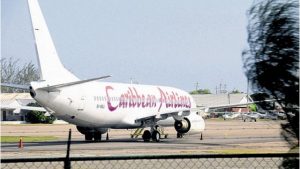 Caribbean nationals who have been complaining about high travel airfare and taxes, could be getting some help from the Caribbean Hotel and Tourism Association (CHTA).
Caribbean nationals who have been complaining about high travel airfare and taxes, could be getting some help from the Caribbean Hotel and Tourism Association (CHTA).
It has warned governments in the region about the adverse effects of high air travel-related taxes and fees on travel as they wrestle with balancing budgets.
“We recognise the challenges facing countries, but it is our duty to point out that taxing for additional revenue may have a reverse effect as tourists may choose not to travel to or within the Caribbean and instead select other destinations because of the high cost of our destinations,” said CHTA’s director general and chief executive officer Frank Comito.
CMC reported that in such a case, Comito said not only would the governments see fewer tax revenues, but local businesses would likely suffer.
“High upfront taxes also typically adversely affect on-island spending by visitors who do come,” he said on Friday following CHTA’s participation in the International Air Transport Association’s (IATA) Aviation Day conference in Barbados, sponsored by IATA, the Caribbean Development Bank (CDB) and the Latin American and Caribbean Air Transport Association.
“They will either opt for shorter stays or spend less on activities, restaurants and attractions to offset the additional cost,” Comito added, noting that the region saw this happen in 2010 and the immediate years following, “as the United Kingdom imposed large duties on travelers to, from and through their country.”
“As the cost of family travel increased by hundreds of dollars, travel demand declined, impacting net tax revenue and employment in those Caribbean destinations, which had a high percentage of UK-based and transient travelers,” he said.
Recognising the damaging effect, Comito said Barbados successfully led the regional lobby against this “restrictive duty, which resulted several years later in the UK [United Kingdom] modifying it and helping to restore travel demand.”
Comito said while Caribbean tourist arrivals have grown in recent years, the region continues to lose global market share and growth within the region.
He said travel is currently heavily skewed to less expensive destinations.
CHTA cited data from the World Travel and Tourism Council and the Caribbean Tourism Organization (CTO) showing an erosion of market share and disproportionate visitor arrivals growth.
Likewise, CHTA said intra-Caribbean travel has declined significantly as the cost of travel within the region has skyrocketed.
Representing the region’s largest private sector tourism organisation, Comito, therefore, urged that greater awareness of the impact of travel and tourism on local economies is needed at a critical time for the Caribbean.
“We need to incentivise travel on the front end,” he said. “Taxing outputs has proved to be a more successful strategy than taxing inputs.”
At the conference, reports shared by IATA and the CDB reinforced the importance of policies that can stimulate travel into and within the region, CHTA said.
It said the CDB and IATA cited high aviation taxes and fees, regulatory barriers and operational deficiencies as obstacles to stimulating more travel, and, by extension, economic growth.
